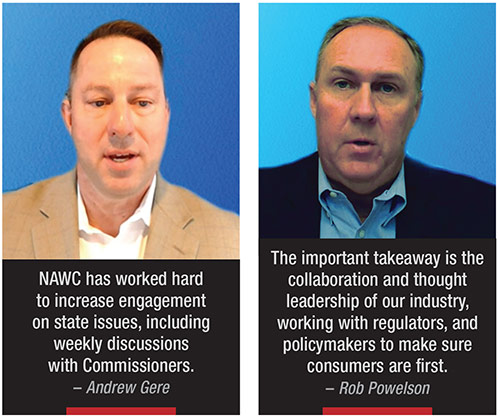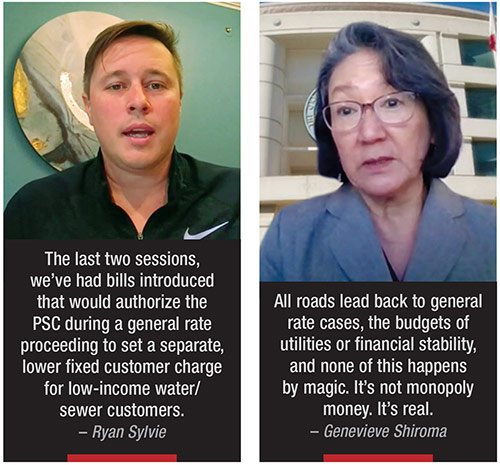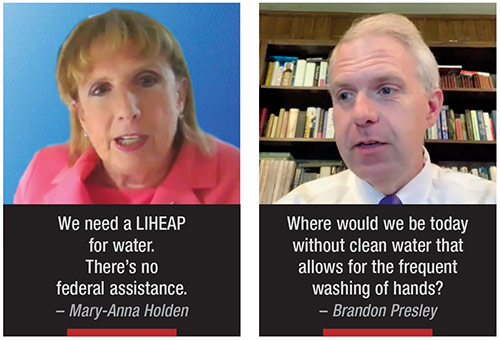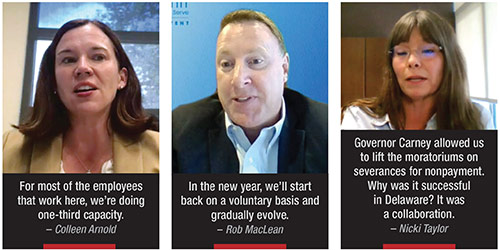Memorable Moments
Rob Powelson is the CEO of the National Association of Water Companies.




The National Association of Water Companies met at October's end for its 2020 Virtual Water Summit, streamed to attendees. While 2020 marked the NAWC's one hundred twenty-fifth anniversary, there were no huge celebrations. That must be put off another year for the COVID weary, instead, the Association pivoted to a theme of, Navigating the Pandemic: Charting A Course for Tomorrow, most unexpected one year ago.
The PUF team was there, to bring you key moments from this dynamic forum for water industry leaders, public officials, regulators, and key stakeholders, who got together online to learn from each another and share ideas and solutions.
Water is so important. It feels like an understatement to state the obvious of how much we need it, even more so during these COVID-19 times.
NAWC, CEO, Rob Powelson: In times of crisis, we must think creatively, act confidently, and work collaboratively to realize our greatest potentials as business and government leaders. We know we're facing unprecedented times, but the important takeaway from today's conference is the collaboration and thought leadership of our industry, working with regulators, and working with policymakers to make sure consumers are first and foremost in the discussion.
We trust you will look back on your time spent with us as productive. We hope you leave today's summit with a better understanding and appreciation for how our industry is responding to the challenges that have been presented by the pandemic.
San Jose Water, CEO, Andrew Gere: I'm the president and chief operating officer of San Jose Water. I'm also chairman of the NAWC board of directors this year.
The virus has made the limits of our ability to plan with certainty painfully clear. We can be certain our industry pulled out all the stops to ensure customers had the safe and reliable water supply needed during the early unknown days of the health crisis, and those efforts will continue.
We changed how we do our business in so many ways that we never expected, and we are stronger for it. We are proud of our frontline workers who kept the water flowing. We moved quickly to institute a voluntary moratorium on shutoffs.
Our customer service operations moved to work from home and maintain the connection between our companies and customers. We're continuing with infrastructure investment, delivering projects on schedule. We've kept our focus on the customer and employees, all the while keeping safety at the forefront.
NAWC has been unabated in efforts to represent us and customers' needs on Capitol Hill, at state regulatory Commissions, and with communications and marketing efforts to ensure our messaging the good works we do resonates beyond our physical footprint. NAWC has been working to ensure we have regulations, so we have cleaner and safer water.
We've been working on encouraging partnerships between municipalities and water companies so communities may benefit from improved water quality. NAWC has worked hard to increase engagement on state issues, switching to virtual webinars, including weekly discussions with Commissioners, providing COVID-19 resources, and intervening in legal proceedings.
California PUC, Commissioner Genevieve Shiroma: Our water utilities provide water for fifteen percent of the customers in California. There are ninety-three water utilities we regulate. They range in size from less than five hundred service connections to greater than ten thousand.
In dealing with the pandemic, it's something as simple as providing a uniform set of statewide policies in the COVID environment to shifting from old paradigms of paper, as we still have regulations that require paper, and our utilities face challenges shifting their billing systems.
We have been coping with wildfires and public safety, power shut offs to prevent wildfires, plus bringing our biggest electric utility out of bankruptcy, PG&E, but we didn't skip a beat in changing to a remote working environment. We also quickly instituted moratoriums on disconnections. We did this through executive director orders and then follow up with votes by the Commission.
We still vote in a virtual environment. We also provided our water utilities quicker access to financing through resolutions. We saw our water utilities needed to be nimbler in terms of availing of federal state loans, grants, and all of this to reduce that financial stress, as there are arrearages compiling.
We've continued with our general rate cases with utility consolidations of smaller utilities, and we've moved ahead on tariff changes. We've held public participation hearings.
In California, our larger class, a utility such as Cal-Am usually provides service for ten thousand connections. Sometimes there are two hundred thousand connections. They've had a long-standing low-income rate assistance program covering about ninety-six percent. Fifteen percent of California customers covered by regulated water utilities of those ninety-six percent have this program available. The qualifications are by household.
That's a fifty percent discount on the fixed monthly service charges. The eligibility is through programs like Medicaid, Medi-Cal, SSI, WIC, healthy families, CalWORKs, LIHEAP, CalFresh, SNAP, the Bureau of Indian Affairs general assistance, and Headstart. Just as other states have issued moratoriums in our case,
the moratorium lasts for a year, until April 2021.
All roads lead back to general rate cases, the budgets of utilities or financial stability, and none of this happens by magic. It's not monopoly money. It's real.
It's a constant tracking of what's happening in this COVID environment. We've also partnered with our sister agency, The State Water Resources Control Board, which has statewide requirements.
Missouri PSC, Chair Ryan Sylvie: Traditionally, water and sewer bills have been a smaller percentage of income compared to electric and gas. That might be why some legislatures have been slow to address it. However, as systems get older, and need upgrades and replacements, the cost can be several magnitudes higher than the original costs built into the rates, which have depreciated over time.
In Missouri, we only have one company that's not considered a small water company. They don't come in as often for rate adjustments and they often times will wait, sometimes decades, before something breaks and then they have to replace it.
That causes the problem. Many of those systems, at least in our state, are in rural areas where a majority of the people are lower income.
Commissions are a creature of statute. We can't do anything unless it's authorized by law. Currently we are not the best situated. We don't have the tools we need to be able to address that adequately.
For the last two sessions in Missouri, we've had bills introduced in the legislature that would authorize the PSC during a general rate proceeding to set a separate, lower fixed charge for customer charges for low-income customers of water and sewer corporations. The aggregate impact of that under this legislation would have to be no more than one half of one percent of the total revenue requirement allocated to the residential customer class.
The Commission could also require the water or sewer corporation to verify a customer's financial status using third party or a community action agency. We've been pushing that legislation for two sessions. We intend to have it introduced again when the legislature returns in January.
A few years ago, we had a pilot program approved allowing for reduction in the customer charge for LIHEAP eligible customers in part of a company's service territory.
That program still exists as a pilot. That might be a template of how we can look at income verification. For instance, if they qualify for LIHEAP, then we can move forward. However, we need clear legislation giving us the authority to do it in a broad sense outside of the pilot, so we're going to keep doing everything we can to get that legislation passed.
New Jersey BPU's Mary-Anna Holden: Our policy is we've asked all utilities to set up a regulatory asset account so that it can defer the costs and allow the utility to spread this out over a longer period of time.
Hopefully, that will help keep the rates low, but we're also looking at different mechanisms. One of things we've been trying to talk to our Congress people about is that we need a LIHEAP for water. There's no federal assistance. We have a local assistance in the state.
We have something called the PAGE program, which is a Payment Assistance for Gas and Electric, but we don't have anything for water. The way PAGE is put together, it's taken unclaimed utility bank deposits and put in a trust fund.
You can't do that because then you're just saying, I'm taking the trust fund from water. There's nothing for the municipal. So again, it comes back to this disparity between the municipal and what they have to follow and what the local utility and investor owned utility has to follow.
NARUC President and Mississippi Commissioner Brandon Presley: One of the most under-appreciated, and it's egregious, is the fact that we don't talk about the water grid more than what we do. We're in the middle of a worldwide pandemic, and where would we be today without clean water that allows for the frequent washing of hands and making sure we meet health guidelines?
We've never before needed clean, reliable, safe water like we have now. The task force on emergency preparedness response and resilience is looking at this. We created a COVID-19 lessons learned subcommittee. We don't want to go through this pandemic again.
We are taking notes, just like the military does after an operation, of lessons learned. What do we know going forward that we did not know back at the first part of this year? From a regulatory standpoint, this is an all hands-on deck type of approach.
This is not where regulators are pitted against the industry. This is where we're all in it together. We've got to get through it together with compassionate leadership. This COVID-19 subcommittee is going to look at that for issues ranging from the commercial paper industry and the liquidity needed in the utility industry to designating workers as essential workers.
What did we not know that we can pick up as regulators and for this industry going forward to make these smart decisions in the future? What are the investments that need to be made?
Are we going to spend the next decade talking about the engineering reports that come out, that show what the needs of infrastructure in our country are? Then, are those of us who are in the regulatory framework going to figure out a way to do something about it? Whether that be through a tracking mechanism, or through whatever type of creative ways can happen, we've got to rebuild the infrastructure of this country.
Artesian Water, SVP, Nicki Taylor: Both of the areas that we serve in Delaware are within our primary service territory. We have a smaller constituency in Maryland, specifically in Delaware. In both states the Commissions have created mechanisms to allow recovery of some different regulatory assets that have been set up.
In both of those regulatory environments, it's a fair and balanced approach. We're all concerned with the welfare of our customers and are sensitive to the difficulties people are going through.
In Delaware this summer, Governor Carney issued an update to the state of emergency, allowing us to lift the moratoriums on the severances for nonpayment. Why was it so successful in Delaware? It was a collaboration. He had his administration bring all of the stakeholders to the virtual table - the Public Service Commission, utilities, public advocates, and municipalities.
We sat in a virtual room and discussed the best way to move forward, how to balance the needs of the companies to keep them solvent and allow for extended payment plans.
We also put additional funds into our Catholic charities programs for folks that need more assistance beyond a payment plan. In Delaware, part of why it works so well is it was a collaborative effort. I'm thankful to our Commissions for being so open-minded about bringing us together and finding the best way to work through this.
SouthWest Water, CEO, Rob MacLean: We call it return to the office because the field workers have always been out working and the office folks have been working from home. We are scheduled to be away at home until the end of the year.
We have a board meeting coming up next week, to talk about this issue. We've done all kinds of preparatory work. We had a call center in Texas where employees were basically shoulder to shoulder with no physical barriers.
We took out some conference rooms, expanded that space, and put in cubes. We've worked on the HVAC system. We evaluated how many air changes we need, changed out filters, and got UV disinfection in the Airstream. We've done things like taking doors off that don't need to be there. We've taken doors that we need, and asked, can we make them touchless?
Category (Actual):
Department:
